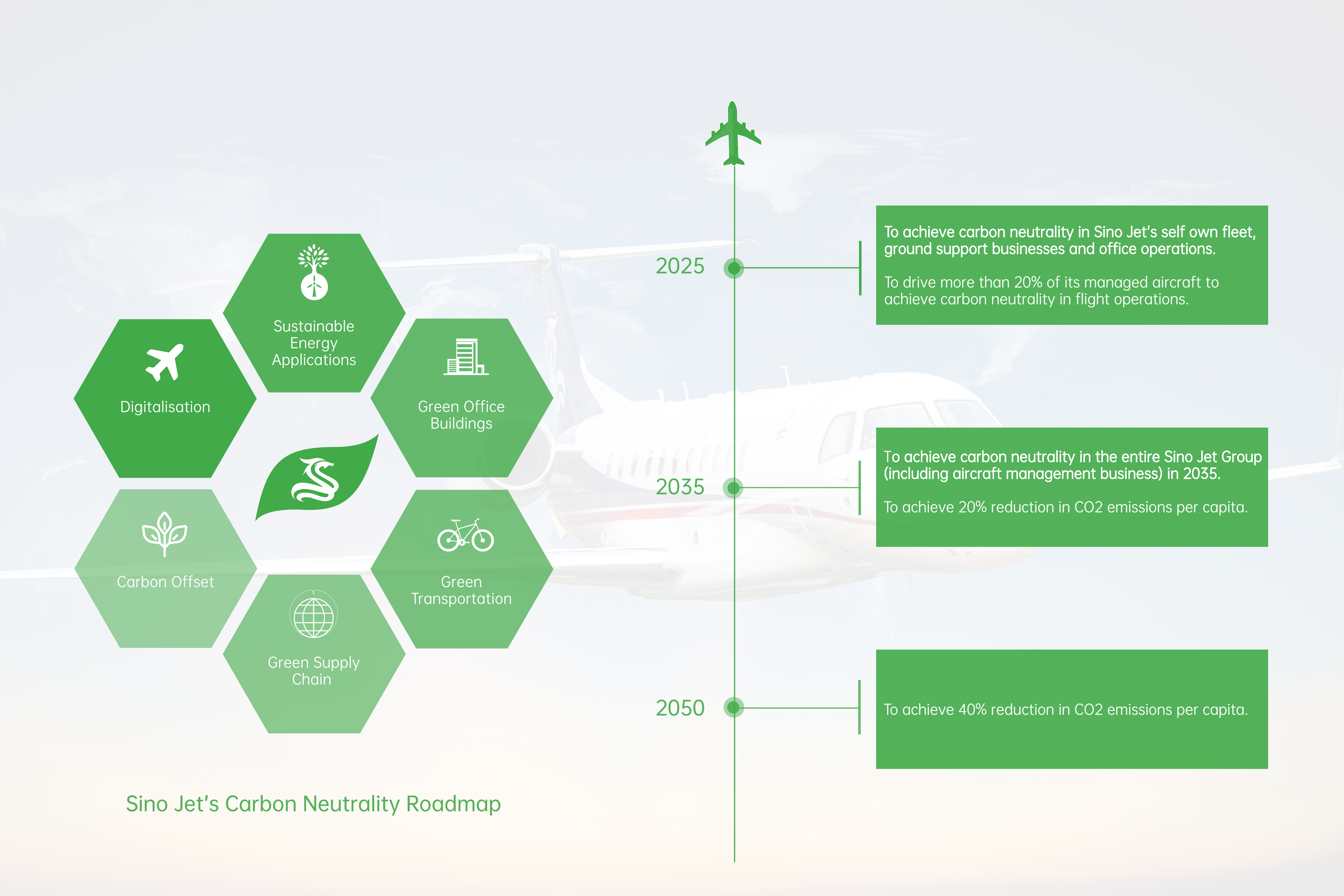Sino Jet Announces Carbon Neutrality Plan
- Written by Telegraph Magazine
HONG KONG SAR - Media OutReach - 5 June 2022 - On World Environment Day, 5th June 2022, Chinese business jet company Sino Jet announced its carbon neutrality goal. Sino Jet plans to align with the aviation industry emission contribution target, utilise the company's technological advantages, to achieve carbon neutrality in its self-own fleet, ground support businesses and office operations in 2025.
And by 2025, Sino Jet aims to drive more than 20% of its managed aircraft to achieve carbon neutrality in flight operations, and ultimately achieve carbon neutrality in the entire Sino Jet Group in 2035.
Reducing greenhouse gas emissions has been a key subject in global sustainable development. "To reach carbon peak by 2030 and achieve carbon neutrality by 2060" is China's solemn commitment to the international community. Sino Jet promptly responds to the nation's calling for the carbon goals, is one of the first companies in the business jet sector to strategise a "green aviation" development. Sino Jet was the first in China to operate a "carbon neutral" business jet flight on April 22 this year, promoting more research and inspiring the industry to explore and develop in carbon emission reduction.
In accordance with ISO 14064-1 and with reference to the "Greenhouse Gas Protocol Corporate Accounting and Reporting Standard" set out by the World Resources Institute, Sino Jet conducted a comprehensive investigation and quantification of the company's carbon emissions base on its operations in 2021. The investigation scope widely covered aircraft trading, aircraft management, charter flights, ground handling services and fixed-base operator (FBO) management. The total Greenhouse Gas (GHG) emissions from the chain of business jet services provided by Sino Jet was found to be 31,612.14 tons, of which Scope 1 emissions (including aviation fuel burn, gas burn, coolant, extinguisher) accounted for 28,282.48 tons and Scope 2 emissions (including purchased electricity and heating) accounted for 345.15 tons and Scope 3 indirect emissions (including commuting, travel, consumables, and waste disposal) accounted for 2,984.49 tons. 
On the basis of the findings of the Greenhouse Gas (GHG) Emissions investigation, Sino Jet has formulated a scientific path to achieve its carbon neutrality goal, and plans to follow the proposition of "focus on energy conservation and emission reduction, then supplement by carbon offsets", to improve existing green practices by digitalisation, sustainable energy applications, green office buildings, green transportation, green supply chain and carbon offset. From these six aspects, Sino Jet aims to achieve its carbon neutrality goals as scheduled.
To expediate the accomplishment of carbon neutrality, Sino Jet's primary goal is to achieve neutrality in operating its self-own aircraft. Sino Jet has already begun with the development of a carbon management system that is suitable for business jet operations, fully integrable with its information management system, to create a quantifiable, traceable green aircraft operation and to achieve neutrality its self-own fleet operations, ground services, and office operations in 2025. In terms of carbon emission per capita within the company, Sino Jet targets a 20% reduction in 2035 and a 40% reduction in 2050.
Sino Jet also seeks to drive more than 20% of its managed fleet to achieve carbon neutrality by 2025, and to achieve carbon neutrality in its entire business including aircraft management by 2035. Sino Jet also plans to incentivise green carbon neutral flight options to encourage its business partners and clients to join its carbon reduction journey.
Looking at Sino Jet's carbon emissions data in 2021, fuel burn was identified as the major source of emissions, and aviation fuel accounted for 88.53%. Naturally, acquiring efficient business jets, enhancing fuel utilization efficiency and construct green aviation system are key steps for Sino Jet to achieve carbon neutrality.
Currently, very few airports in the world supply sustainable aviation fuel (SAF) and most of these airports are located in Europe and North America. Civil Aviation Administration of China (CAAC) sets out a roadmap for green development in January 2022 to seek green and low-carbon development. China plans to significantly increase the use of SAF in 2030. In light of this roadmap, Sino Jet has reached an agreement with China National Aviation Fuel Group Limited (CNAF) to be the pilot client for SAF at all domestic airport. Sino Jet also pledges to opt for SAF wherever possible.
Sino Jet understands that working to achieve carbon neutrality is corporate social responsibility. Sino Jet's goal does not stop at achieving carbon neutrality itself, but to also encourage other stakeholders, including aircraft manufacturers, fuel suppliers, airports, ground transportation companies to jointly explore more innovative ways to reduce carbon emissions and conserve energy, to develop sustainably, to help traditional industries evolve and most importantly to combat global warming.
About Sino Jet
Sino Jet has dual headquarters in Beijing and Hong Kong. The company is also rapidly expanding in Mainland China with bases in Shanghai, Hangzhou, Shenzhen, Guangzhou, Xiamen, Zhuhai, Chengdu and Singapore etc.
#sinojet #carbonneutral #CarbonNeutrality #GreenAviation #AviationSustainability #SAF











